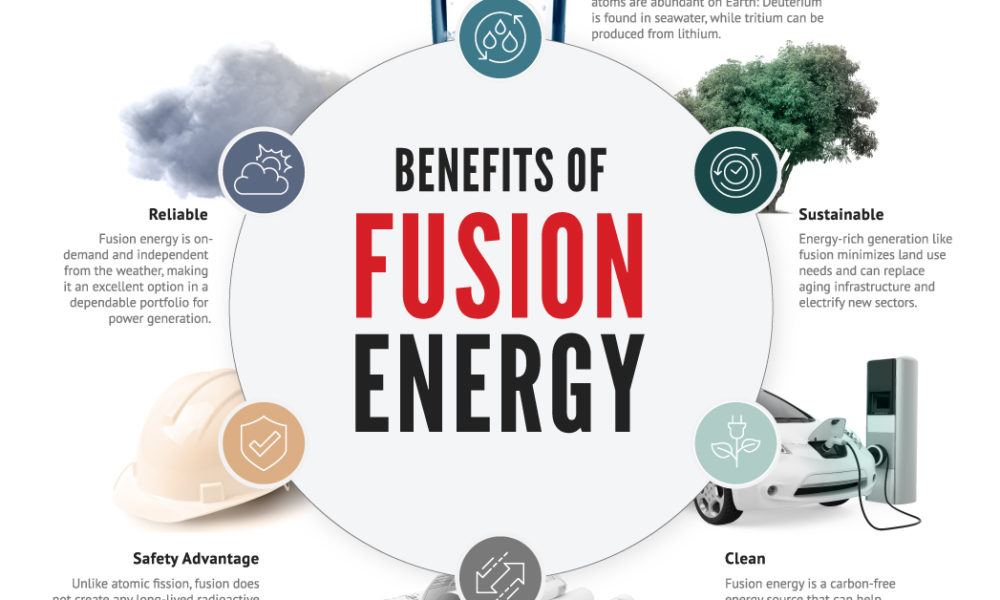The Benefits of Nuclear Fusion
At [Your Website Name], we believe that nuclear fusion holds tremendous potential for the future of energy production. In this article, we will explore the numerous benefits of nuclear fusion and why it has the potential to revolutionize the way we generate electricity.
Clean and Sustainable Energy
Nuclear fusion is a clean and sustainable energy source that produces virtually no greenhouse gas emissions or air pollutants. Unlike nuclear fission, which is currently used in nuclear power plants, fusion does not produce long-lived radioactive waste. This makes it an attractive option for addressing the global challenge of climate change.
Abundant Fuel Supply
The fuel used in nuclear fusion, such as hydrogen isotopes deuterium and tritium, is abundantly available in seawater and the Earth’s crust. The amount of fuel present in seawater alone could potentially meet the world’s energy needs for millions of years. This virtually limitless supply of fuel ensures long-term energy security.
High Energy Efficiency
Nuclear fusion has the potential to achieve much higher energy efficiency compared to other energy sources. The fusion process releases a tremendous amount of energy, several times greater than that of fossil fuels or even nuclear fission. This means that a small amount of fuel can generate a significant amount of energy, making fusion highly efficient and cost-effective in the long run.
Safety and Containment
One of the key advantages of nuclear fusion is its inherent safety features. Unlike nuclear fission, which relies on a delicate balance of control mechanisms, fusion reactions are self-limiting. In the event of any disruption or failure, the fusion reaction stops automatically, minimizing the risk of accidents or meltdowns. Additionally, fusion reactors do not produce weapons-grade byproducts, further enhancing their safety.
Minimal Land Use
Nuclear fusion power plants require relatively small land areas compared to other renewable energy sources such as solar or wind farms. This makes fusion an attractive option for densely populated areas or regions where land availability is limited. With the increasing global demand for energy, the compact footprint of fusion reactors becomes a significant advantage.
Baseload Power Generation
Nuclear fusion has the potential to provide a stable and continuous supply of electricity, making it ideal for baseload power generation. Unlike intermittent renewable energy sources like solar or wind, fusion reactors can operate 24/7, ensuring a constant and reliable power supply. This characteristic makes fusion an essential component of a diversified and sustainable energy mix.
Technological Advancements
Investing in nuclear fusion research and development drives technological advancements in various fields. The pursuit of fusion energy has led to breakthroughs in plasma physics, materials science, superconducting magnets, and more. These advancements have the potential to benefit other industries, such as medicine, transportation, and computing, thereby fostering innovation and economic growth.

In conclusion, nuclear fusion offers numerous benefits that make it an attractive option for future energy generation. Its clean and sustainable nature, abundant fuel supply, high energy efficiency, safety features, minimal land use, and potential for baseload power generation make it a promising solution to address our growing energy needs while mitigating climate change. Additionally, the pursuit of fusion energy drives technological advancements that can have far-reaching benefits beyond the energy sector. At [Your Website Name], we believe in the immense potential of nuclear fusion and its ability to shape a sustainable future for generations to come.
Frequently Asked Questions about the Benefits of Nuclear Fusion
1. What is nuclear fusion?
Nuclear fusion is a process in which two atomic nuclei combine to form a heavier nucleus, releasing an enormous amount of energy in the process.
2. How is nuclear fusion different from nuclear fission?
Nuclear fusion involves the merging of atomic nuclei, while nuclear fission involves the splitting of atomic nuclei. Fusion releases more energy than fission.
3. What are the main benefits of nuclear fusion?
The main benefits of nuclear fusion include a virtually limitless fuel supply, minimal greenhouse gas emissions, and the absence of long-lived radioactive waste.
4. Can nuclear fusion provide a sustainable source of energy?
Yes, nuclear fusion has the potential to provide a sustainable and clean source of energy as it relies on abundant resources like hydrogen isotopes.
5. Is nuclear fusion safe?
Nuclear fusion is inherently safe because it doesn’t involve the risk of a runaway chain reaction or meltdowns like in nuclear fission. It produces no high-level radioactive waste.
6. Can nuclear fusion help combat climate change?
Yes, nuclear fusion can play a significant role in combating climate change as it produces no greenhouse gas emissions and has the potential to replace fossil fuel-based power generation.
7. How far along are we in achieving practical nuclear fusion?
While significant progress has been made, practical nuclear fusion is still in the experimental stage. Scientists and engineers are working on developing viable fusion reactors.
8. What challenges need to be overcome for nuclear fusion?
Some of the challenges include achieving and sustaining the necessary high temperatures and pressures for fusion, as well as finding suitable materials that can withstand extreme conditions.
9. Will nuclear fusion be cost-effective?
Efforts are being made to make nuclear fusion economically viable. Once the technology is fully developed, the cost of fusion energy is expected to be competitive with other forms of power generation.
10. When can we expect nuclear fusion to become a reality?
While it is difficult to predict an exact timeline, experts estimate that practical nuclear fusion could become a reality within the next few decades.




